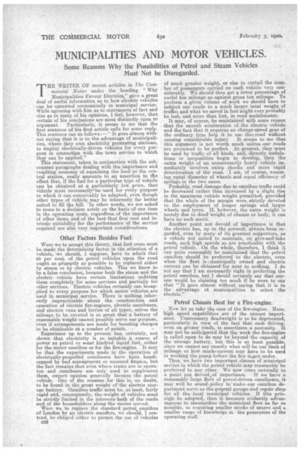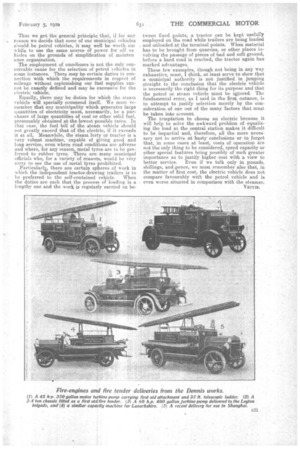MUNICIPALITIES AND MOTOR VEHICLES.
Page 20

Page 21

If you've noticed an error in this article please click here to report it so we can fix it.
Some Reasons Why the Possibilities of Petrol and Steam Vehicles Must Not be Disregarded.
THE WRITER OF recent articles in The Commercial Motor under the heading "Why Municipalities Favour Electrics," gave a great deal of useful information as to how electric vehicles can be operated economicallyin municipal service. While agreeing with him as to statements of fact and also as to many of his opinions, I feel, however, that certain of his conclusions are most distinctly open to argument. Particularly, it seems to me that the first sentence of his first article calls for sonic reply. This sentence ran as follows:—" It goes almost without saying that it is to the advantage of municipalities, where they own electricity generating stations, to employ electrically-driven vehicles for every purpose in connection with the town service to which
they can be applied." ,
This statement, taken in conjunction with the subsequent paragraphs dealing with the importance and resulting economy of equalising the load at the central station, really amounts to an assertion to the effect that, if the fuel for a particular type of vehicle can be obtained at a particularly low price, that vehicle must necessarilyibeused for every purpose to which it can conceivably be adapted, even though other types of vehicle may be inherently far better suited to fill the bill. :In other words, we are asked :to come to a decision solely on the basis of one item in the operating costs' regardless. of the importance of other items and of the fact that first cost and intrinsic suitability for the performance of the service required are also very important considerations.
. Other Factors Besides Fuel.
Were we to accept this theory, that fuel costs must be made the determining factor in the selection of a vehicle, we should, I suppose, have to admit that 95 per cent. of the petrol vehicles upon the road ought as premptly as possible to be replaced either by steam or by electric vehicles. This we know to be a false conclusion, because both the steam and the electric vehicle have certain limitations unfitting them completely for some services and partially for other services. Electric vehicles certainly can bempplied to every purpose for which motor vehicles, are used in municipal service. There is nothing inherently impracticable about the construction and operation of electric fire-engines, electric omnibuses,. and electric vans and lorries of all types, unless the mileage to be covered is so great that a battery of reasonable weight cannot possibly serve our-purpose, even if arrangements are made for boosting charges to be obtainable at a number of points. , Experience up to the present has, certainly, not shown that electricity is so suitable a source of power as petrol or somekindred liquid fuel, either for the motor omnibus or for the fire-engine. It may be that the experiments made in the operation of electrically-propelled omnibuses have been handicapped by bad management or unsound finance, but the fact remains that even where.trams are in operaton and omnibuses are only used to supplement them., expert opinion generally favours the _petrol vehicle. One of the reasons for this is, no doubt, to be found in the great weight of'the clectrie storage battery. Omnibus -traffic must be, at least, fairly rapid aild, consequently, the,weight of vehicles must he strictly limited in the interests-both of the roads and of the householders along the routes served.
Were we to replace the standard petrol omnibus of London by an electric omnibus, we should, I contend, be obliged either to permit the use of vehicles • o30 of much greater weight, or else to curtail the number of passengers carried on each vehicle very considerably. We should then get a lower percentage of useful ton mileage as against gross ton mileage. To perform a given volume of work we should have to subject our roads to a much larger total weight of traffic; and what we saved in fuel might very probably be lost, and more than lost, in road maintenance.
It may, of course, be maintained with some reason -that the smooth acceleration of the electric vehicle and the fact that it requires no change-speed gear of the ordinary type help it to use thetroad without causing considerable injury. It seems to me that this argument is not worth rauch unless ,our roads are presumed to be perfect. At present, they must be used by traffic of all kinds, and, directly undulations or inequalities begin to develop, then the extra weight of an unnecessarily heavy vehicle immediately involves extra shocks and more rapid deterioration of the road. I am, of course, assuming.equal diameter of wheels and equal efficiency of springs in the two cases.
Probably, road damage due to omnibus traffic could be decreased rather than increased by a slight rise in the maximum vehicle weight permitted, provided that the whole of the margin were strictly devoted to the employment of longer springs and larger wheels and tyres. If, hoWever, the extra weight is merely due to dead-weight of chassis or body, it can have no such merit.
Another point not devoid of importance is that the electric has, up to the present, always been-regarded, even by many of its greatest supporters. as a vehicle not suited to maintain, on give-and-take roads, such high speeds as are practicable with the petrol vehicle. On the whole, therefore, I think it can quite reasonably be maintained that the petrol omnibus should be preferred to the electric, even when the fleet is municipally owned and electric current an be obtainedefor next to nothing. I do not say that I am necessarily right in preferring the petrol omnibus, but I should certainly say that anyone would be claiming too much if he were to say that "It goes almost without saying that it is to the advantage of municipalities to select the electric."
Petrol Chassis Best for a Fire-engine.
Now let us take the case of the fire-engine. Here, high speed capabilities are of the utmost importance. Unnecessary deadweight is to be deprecated, particularly in view of the fact that rash driving, even on greasy roads, is sometimes a necessity. It may not be anticipated that the work the fire-engine is called upon to do may be beyond the capacity of the storage battery, but this is at least possible, since we cannot say exactly what will be our limit of mileage or how muchecurrent may have to be used in working the pump before the fire 1B1t:cot under. Thus, we have two important classes of municipal service in which the petrolvehiele may reasonably be preferred to any other. We now come naturally to a point not devoid,of importance. If we have a reasonably large fleet of petrol-driven omnibuses, it may well 'be sound,pelicy to'reake our omnibus departsaent serve as the general garage and repair shop for all the local municipal vehicles. If this principle be adopted, then it becomes evidently advantageous to standardize the municipal fleet as far as possible, so requiring smaller stocks of spares and a smaller range of knowledge in the possession of the operating staff. Thus we get the general principle that, if for any reason we decide that some of our municipal vehicles should. be petrol vehicles, it may well be worth mu while to use the same source of power for al/ Ye hicks on the grounds of simplification of., mainten anee organization.
The employment of omnibuses is not the only conceivable cause for the selection of petrol vehicles in some instances. There may be certain duties in connection with which the requirements in respect of mileage without replenishing our fuel supplies can.not be exactly defined 3,nd may be excessive for the electric vehicle.
Equally, there may be duties. for which the steam vehicle will specially commend itself. We must remember that any municipality which, generates large quantities of electricity must, necessarily, be a purchaser of large quantities of coal or other solid fuel, presumably obtained at the lowest possible rates. In that ease, the fuel bill of the steam vehicle should not greatly exceed that of the electric, if it exceeds it at all. Meanwhile, the steam lorry or tractor is a very robust machine, capable of giving good and long service, even where road conditions are adverse and where, for any reason, metal tyres are to be preferred to 'rubber tyres. There are many municipal officials who, for a variety of reasons, would be very sorry to see the use of metal tyres prohibited.
Particularl. there are certain spheres. of work in
• which the independent-tractor-drawing trailers is to
be preferred to the self-contained vehicle. When the duties are such that the process of loading is a lengthy one and the work is regularly carried on be tween fixed points, a tractor can be kept usefully employedd, on the road while trailers are being loaded and unloaded at the terminal points.When material has to be brought from quarries, or other places involving the passage of pieces of bad ancl soft ground, before a hard road is reached, the tractor again has marked advantages. These few examples, though not being in any way exhaustive, must, I think, at least serve to show that a municipal authority is not justified in jumping straight to the conclusion that the electric vehicle is necessarily the right thing for its purpose and that the petrol or steam vehicle must be ignored. The fundamental error, as I said in the first-, aistance, to attempt to justify selection merely by the consideration of one out of the many factors that must be taken into account.
The temptation to choose an. electric because it will help to solve the awkward problem of equalizing the load at the central station makes it difficult to be impartial and, therefore, all the more necessary not to arrive at hasty' conclusions or to forget that, in some eases at least, costs of operation are not the only thing to be considered, speed capacity or, other special features being possibly of such greater importance as to justify higher Cost with a view to better service. Even if we talk only in pounds, and .pence, we must remember also that, in the matter of first cost, the electric vehicle does not compare favourably with the petrol vehicle and is even worse situated in comparison with the steamer.






























